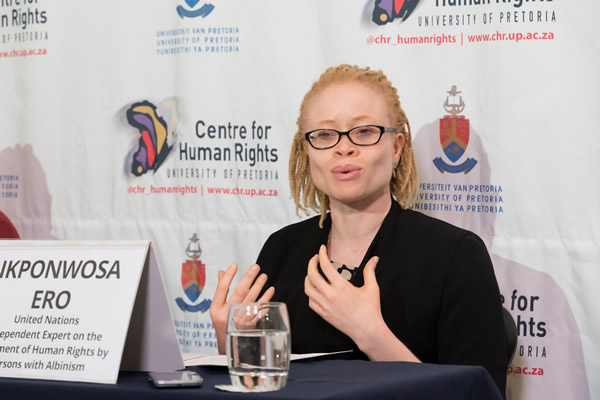The Centre for Human Rights, in partnership with Open Society Foundations and the United Nations Independent Expert on the enjoyment of human rights by persons with albinism, held a high-level meeting on 8 November 2016. This meeting formed part of a number of events that focused on advancing the rights of persons with albinism in Africa.
The meeting was convened by the UN Independent Expert on the enjoyment of human rights by persons with albinism, Ikponwosa Ero, who was grateful to all stakeholders for making the forum a reality at such short notice. The meeting brought together high-level stakeholders from the United Nations, the African Union, government, diplomats, civil society including academia and leaders of organisations representing persons with albinism.
The objective of the meeting was to consult with leaders of influence in the region and receive their input on a draft Action Plan on the rights of persons with albinism which had been put together at an initial forum held 17-19 June 2016 in Dar es Salaam, Tanzania.
Participants agreed that, despite best efforts made thus far in Africa, violence and discrimination against persons with albinism as well as trafficking and cross-border sale of their body parts continues to be a worrying trend on the continent. Consequently, they identified priorities that required urgent attention in the draft action plan including measures for protection of persons with albinism from attacks as well as measures to promote accountability, justice and the abatement of discrimination. In many cases participants pledged commitments to particular measures identified in the plan.
Key resolutions from the meetings include: that governments in Africa should continue appointing persons with albinism to visible and important positions to reduce negative perceptions; civil societies have a role in awareness raising; the private sector can help and play a role through corporate social responsibility; sunscreen for persons with albinism should be on the national drug-list of essential medicines, there is a need to enhance the security of persons with albinism and the strict enforcement of the law particularly at border communities. The cross-border nature of attacks particularly trafficking of body parts need to be captured in the draft action plan; the issue of birth and death registration is important. It will help to provide a full picture on the whereabouts of children with albinism and advance evidence-based policy making. A need to work with organizations such as UNESCO was also raised. UNESCO has demonstrated measurable success in raising awareness on albinism in Tanzania and are regionally working with Interpol to prevent trafficking of cultural goods. The need for governments to develop policies for persons with albinism was also identified as necessary to complement law and to drive the inclusion of persons with albinism from the margins into the mainstreams where they can fully enjoy their human rights.
As the UN begins to implement the 2030 Agenda for Sustainable Development which promises to leave no one behind, actions from these stakeholders who occupy important and influential positions are necessary to reach persons with albinism who constitute the furthest behind – a constituency which the Agenda promises to target first in the execution of its goals.


